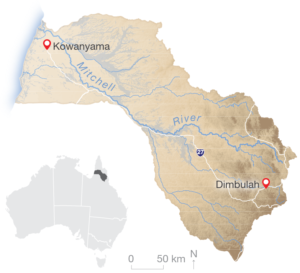Keywords: Environmental flows, eflows, e-flows, flooding, flood, rivers, wetlands, wetland, waterhole, waterholes, estuaries, mangroves, river catchment, freshwater wetlands, Ramsar wetlands, flow regimes, estuary, aquatic life, fisheries, commercial fisheries, rec fisheries, recreational fisheries, subsistence fishing, fishing, barra, barramundi, riparian, vegetation, Griffith University, Australian Rivers Institute, ARI, Griffith ARI, Stuart Bunn
The Australian Government has identified water-resource development in the north of Australia as a priority for the coming years and Queensland’s Mitchell River is a focus of this interest. The Queensland Government currently regulates small amounts of water extraction from the Mitchell River, meaning that flows are largely unregulated. The catchment supports existing water users including Traditional Owners as well as significant ecological assets, including wetlands of national significance, threatened species, traditional harvests, and commercial and recreational fisheries. Information on the water needs of freshwater ecosystems and their associated biodiversity is required to guide decision-making around water planning and development.
This project examined the links between freshwater flows and floodplain inundation, aquatic plant biomass accumulation, floodplain subsidies to freshwater food webs, fish movement and fisheries production. The research had five major objectives.

The Mitchell River flows west from its headwaters in the Daintree rainforest to its mouth in the Gulf of Carpentaria.
Hub research in the Gulf of Carpentaria aims to support sustainable development in the region. This includes research to inform water allocation planners and floodplain managers about the potential impacts of changes in flow on fisheries, migratory birds and biodiversity. Rivers that flow into the southern Gulf of Carpentaria are home to high-value ecosystems and support important recreational and commercial fisheries. With increasing development in the region, more information is needed to understand how future water development will impact on the health and productivity of floodplains and coastal areas.
Martin Kainz presents how fatty acids can be used as biomarkers in analysing food webs and trophic flow.
Mike Venarsky presents at the December 2018 DES (Qld) Workshop about the community-level migration patterns of fish in the Mitchell River and some of its tributaries.
David Crook discusses how otolith chemistry can help explain and document fish life history.
Glenn McGregor presents on how environmental assessments contribute to the evaluation of Water Plans in Queensland at a DES Workshop from December 2018.
Jonathan Marshall explains how paleo-ecological tracers can help understand past ecosystem variability to predict and manage now and into the future.
The “Environmental water needs for the Mitchell River” project is supporting water planning and floodplain management in the Mitchell River catchment through increasing our understanding of the links between river flows, flooding and ecosystem assets such as fish and fisheries.
This project was led by Professor Stuart Bunn and Dr Ben Stewart-Koster from Griffith University.
They were supported by researchers from Griffith University, CSIRO, Queensland Department of Science, Information Technology & Innovation, Queensland Department of Agriculture & Fisheries, and Charles Darwin University.
Contact
Stuart Bunn or Ben Stewart-Koster